The educated, respectable and established Muslims voices, that were on the modernising side on the Shah Bano issue, are fighting on the opposite side now, mostly because they worry about Narendra Modi, observes Shekhar Gupta.

How can there be so much emotion among the many modern and wise people in India in favour of the choice to wear the hijab when women in Iran are risking their lives -- and often sacrificing it -- to fight to free themselves from it?
That argument, for the hijab-sceptics in India is self-serving and defeats itself.
Because the women in Iran are fighting for the choice not to wear the hijab if they so wish.
They have no issue with those who are happy to use the hijab doing so.
In India, the tussle is very limited. It isn't about the choice of whether a Muslim woman can wear the hijab or not.
For sure anybody who so wishes can. Our current debate is limited to this being a right also for school-going non-adults.
The Karnataka issue is about young women, all in their teens, going to senior school wearing the hijab above their uniforms.
It is likely that the issue has been distorted in the public mind because the institutions involved are called 'college'.
But these are junior colleges, or senior schools, teaching students in Classes 11 and 12.
By implication, only a rare student would be adult yet, if at all.
In India we pass Class 12 normally by age 17. That should help us finesse the issues.
There is no such thing as a non-polarised time in a democracy. But at this juncture, we are more polarised than ever in our history.
This is a clinically factual statement because what else do we conclude from a situation where one party has won two successive majorities almost entirely on the strength of one faith's votes?
In the two Lok Sabha elections of 2014 and 2019, 586 candidates have been elected on the Bharatiya Janata Party ticket and not one out of them was a Muslim.
A polarised electorate produces a government of one side.
It is natural then that it brings insecurities and discomfort for those left out.
The cornered minorities tend to lean back and protect the roots and fundamentals of what is so dear to them. Politically, it can often be a bad trap.
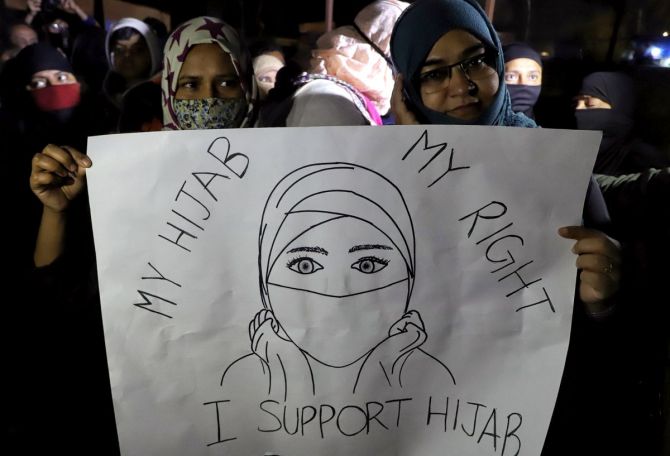
To unravel this complexity, we go back 37 years to the Shah Bano case.
It was a simple enough case of a 73-year-old divorcee going to court seeking an alimony.
A personal case became a religio-political cause celebre as the Muslim clergy saw it as a challenge to their personal law -- which does not provide for any alimony except for what is the committed mehr at the time of the nikaah.
The case reached the Supreme Court where the Bench, headed by who else but then Chief Justice Y V Chandrachud, the father of the next CJI-to-be, ruled in favour of the Indore woman divorced after 43 years now marriage.
She was awarded an alimony of -- hold your breath -- a mere Rs 500 a month.
But it was seen as an assault on the Muslim way of life.
Many Muslim mobs burnt the effigies of Justice Chandrachud senior.
I reported it and wrote a cover story for India Today then, in 1985, and among the people I went to speak with was Maulana Abul Lais, then emir of the Jamaat-i-Islami-Hind.
He's quoted as saying that the Indian Muslims' fight wasn't so much about their lives and property. It was about their culture and identity.
This wasn't just confined to the clergy. Even Syed Shahabuddin, with top education, a former diplomat and brilliant intellectual, weighed in with the conservative side.
He challenged the judgment intellectually and politically by contesting the Kishanganj by-election in Bihar (which Rajiv Gandhi's Congress had won by 130,000 votes a year earlier) and won.
I went to speak with him as well and he, as usual, spoke with clarity.
This, he said was a fight against the 'inexorable process of assimilation'.
And how was he fighting it? By destroying the Congress party's Muslim vote bank: 'This Muslim vote bank has come crashing down. And all the king's horses and all the king's men cannot put it back here again.'
Shahabuddin was right in that the Congress Muslim vote bank has never been put back again post-Shah Bano.
It also angered the Hindus and fuelled the BJP campaign of minority appeasement.
The many further blunders Rajiv made in trying to assuage the Hindus now, including the unlocking of the Babri-Ayodhya site -- which Jairam Ramesh recently acknowledged as an error -- angered the Muslim minority even more, and failed to convince the Hindu majority.
The political result, finally, is the two successive majorities for Narendra Modi's BJP.
Remember again, it was all about a Rs 500 a month alimony for a 73-year-old, mostly illiterate and poor, divorcee.
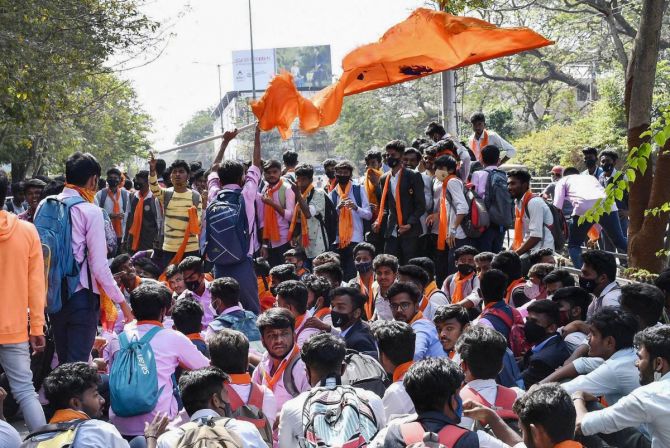
It isn't as if there weren't voices of modernity. There were many within the Muslim community.
Arif Mohammed Khan, then a minister in Rajiv's Cabinet, argued for not interfering with the judgment.
'My faith, Islam is progressive and modernising,' he said in an interview for the same story. Ultimately he had to resign.
Quoted in the same 1985 story is Shahid Siddiqui, then the young editor of the Urdu daily Nai Duniya and now one among the five Muslim notables who met for that conversation with RSS Sarsanghchalak Mohan Bhagwat.
'Every small-town maulana has become a leader now with narrow objectives and narrow interests,' Siddiqui said.
There was also Kausar Azam, who taught political science at Hyderabad's Osmania University. She rued the absence of reformers like Mahatma Gandhi and Raja Ram Mohan Roy among the Muslims and the sad fact that a moderniser like Hamid Dalwai died so young.
Another liberal, modern voice featured in the story is that of noted JNU professor Zoya Hassan.
The liberal, modern voices then were all overlooked and there were political consequences.
Consequences so serious that almost four decades later, we are caught in a very similar tussle over the hijab issue.
The issue of 'choice' here is also a code for protecting culture, identity, pushing back 'inexorable assimilation and so on.
The big difference is that the educated, respectable and established Muslims voices, that were on the modernising side on the Shah Bano issue, are on the other side now.
They fought a good moral and intellectual battle then and lost.
They are fighting on the opposite side now, mostly because they worry about Narendra Modi.
Unfortunately for them, they are set to lose again.
By special arrangement with The Print
Feature Presentation: Aslam Hunani/Rediff.com

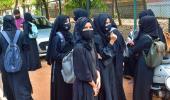


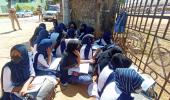



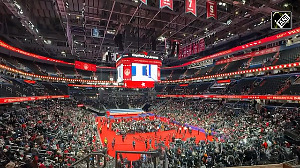


 © 2025
© 2025